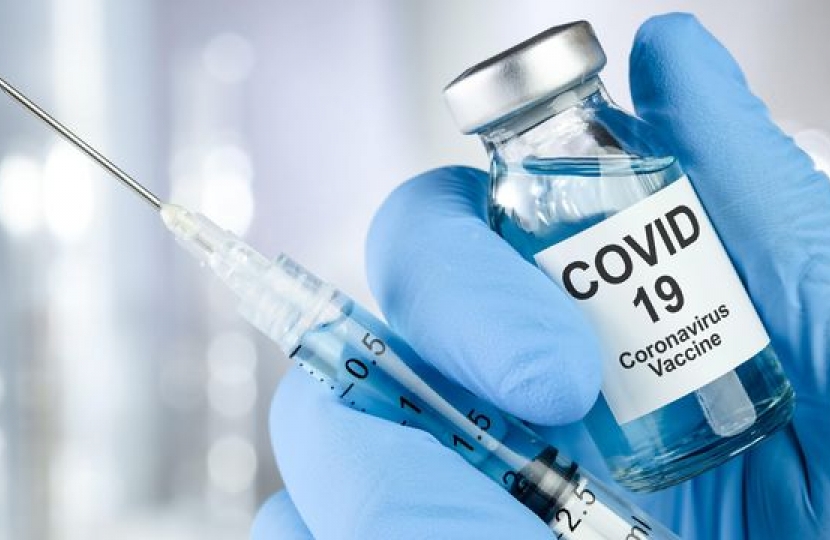
The government has set out a UK COVID-19 vaccines delivery plan for vaccinating tens of millions of people by spring.
The UK COVID-19 vaccines delivery plan sets out how the government will work with the NHS, local councils and the armed forces to deliver the largest vaccination programme in British history.
As more vaccine supply becomes available to the NHS, the Prime Minister has said that by 15th February everyone in the top four priority groups should have been offered one dose of a Covid-19 vaccine. These are people aged 70 and over, care home residents, the clinically extremely vulnerable, and the health and social care staff looking after them.
In North West Norfolk, the first local vaccinations service was St. James Medical Practice. Snettisham surgery will begin this week as the main vaccination hub for the coastal practices (Heacham, Hunstanton, Dersingham, Grimston, Docking, Great Massingham, the Burnhams) joining St James, and QEH, that are already providing vaccinations.
There will be 21 local vaccination sites in Norfolk and Waveney, in addition to the hospital hubs at QEH, James Paget University Hospital, and Norfolk and Norwich University Hospital sites.
In addition there will be large vaccinations sites including locations in North West Norfolk. James has been working with the NHS and local councils in order to provide sufficient coverage in West Norfolk and details of the sites will be released nearer their opening dates.
All eligible patients will be contacted by phone when your appointment is due, and this could be at short notice. Please do not contact your local surgeries, but wait for someone to phone you to let you when you vaccination appointment has been scheduled.
The vaccination programme has seen over 2 million people received jabs so far. More people have been vaccinated than anywhere else in Europe, including 40% of people aged 80 or over in Norfolk and Waveney.
All residents and staff in over 10,000 care homes across the country are due to be offered a vaccine by the end of the month.
This will be made possible by the rapid expansion of the programme, including:
- 206 active hospital sites
- 50 vaccination centres
- around 1,200 local vaccination sites – including primary care networks, community pharmacy sites and mobile teams
By the end of this coming week there will be over 1,000 GP-led sites providing vaccines as well as 223 hospital sites, seven vaccination centres in places such as sports stadia and exhibition centres and a first wave of community pharmacies
The government have a list of vaccine sites on the NHS website, so you can check what services are available in each constituency. You can find this here.
FAQs
When will I be vaccinated?
The NHS will contact you to make your appointments when it is time for you to be vaccinated. For most people they will receive a letter either from their GP or the national booking system; this will include all the information they need, including their NHS number. Some services are also phoning and texting patients to invite them in.
We know lots of people will be eager to get protected but we would ask people not to contact the NHS to get an appointment until they are contacted, so that where possible those at greatest risk are offered the vaccine first.
What is the guidance on second doses for Oxford/AstraZeneca Vaccine?
The four UK CMOs have said that, ‘Prioritising the first doses of vaccine for as many people as possible on the priority list will protect the greatest number of at risk people overall in the shortest possible time’ and ‘will have the greatest impact on reducing mortality, severe disease and hospitalisations and in protecting the NHS and equivalent health services’.
When you book your first dose you will also be asked to book your second too. For most people this will be within three months of their first dose. The UK Chief Medical Officers have agreed this longer timeframe so that more people can get their first dose quickly, and because the evidence shows that one dose offers a high level of protection. Patients still need to receive their second vaccine, and it is important that they attend their second appointment once scheduled.
PHE, the JCVI and the MHRA state that if you have a first dose of one vaccine, your second dose will be of that same vaccine too and that is what NHS organisations have been instructed to do.
It is also important that anyone who has had the vaccine continues to follow government guidance on social distancing and wearing a mask as well as the additional measures in place where they live.
Who will deliver the vaccine?
The overall rate limiting factor over the coming weeks is the amount of vaccine available, which is higher in January than December, and will be increasing yet further in February, March and April. We have enough vaccinators to deliver the vaccine we currently have and have been recruiting and training tens of thousands more who will be drafted in as more supplies become available.
We are delighted that many former members of NHS staff, as well as existing staff and many others who have never worked in the NHS, have applied for vaccinator roles.
We are working with the Royal Voluntary Service and St John Ambulance to recruit and train thousands more volunteer vaccinators, who will have all the relevant clinical training – as well as supervision - to ensure they can vaccinate in a way that is safe for patients and for themselves.
When will care home residents be vaccinated?
Local GP-led primary care networks have now vaccinated hundreds of thousands of older and vulnerable people across the country, including in care homes. All older care home residents are expected to have been offered vaccination by local GPs by the end of this month. The new Oxford vaccine is easier to transport and store than the Pfizer jab, so is now also being used for care home residents who often cannot travel to a larger vaccination service or hospital hub.
The NHS is making extra funding available to GPs to do so.
When will NHS staff be vaccinated?
NHS organisations have now started vaccinating staff as more supplies of vaccine are coming on stream. NHS England has written to Trusts to outline plans to vaccinate all frontline staff against Covid-19 following the rollout of the Oxford-AstraZeneca vaccine.
From the middle of January, all NHS Trusts will be able to provide vaccinations for local healthcare and social care workers, which will be critical in keeping both them and patients safe. The life-saving jab will be offered to all staff across NHS services, including those who work in general practices, pharmacies, dentists and other primary and secondary care settings. It will also be available to ambulance trusts, volunteers and all independent providers, such as community-based mental health services.
What is the advice to the public?
The large increase in cases hospitals we are seeing and the emergence of a new variant of the virus also show that we cannot let our guard down now and even those who have received a vaccine still need to follow social distancing guidance.
The public have an important part to play to help them do all of this, so we are asking:
- please continue to follow all the guidance to control the virus and save lives – that means staying at home and following the ‘hands, face, space’ guidance when you are out;
- please don’t contact the NHS to seek a vaccine, we will contact you;
- and when we do contact you, please attend your booked appointments.
How can I find out how many people have been vaccinated so far?
NHS England has published weekly data report showing the number of COVID-19 vaccinations provided by the NHS in England. This dataset is now daily and will develop over time as we are able to quality assure data. You can find this information here.
More information
- Vaccination programme briefing here.
- A COVID-19 myth buster here.
- As COVID-19 risk increases with age, prioritisation is primarily based on age.
Priority groups:
- residents in a care home for older adults and their carers
- all those 80 years of age and over and frontline health and social care workers
- all those 75 years of age and over
- all those 70 years of age and over and clinically extremely vulnerable individuals
- all those 65 years of age and over
- all individuals aged 16 years to 64 years with underlying health conditions which put them at higher risk of serious disease and mortality
- all those 60 years of age and over
- all those 55 years of age and over
- all those 50 years of age and over


